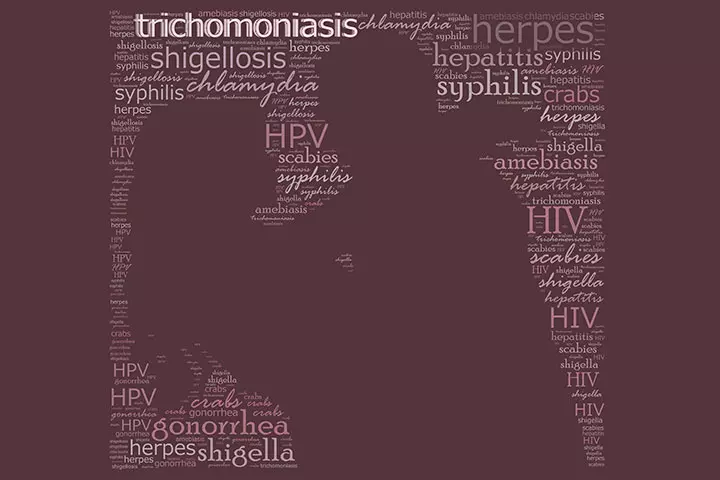
Image: ShutterStock
Pregnant women feel quite tired, especially in the first trimester, and require more sleep than usual. However, most women are worried about how to sleep during pregnancy in the first trimester. Making some lifestyle changes and finding some comfortable and safe sleeping positions during this time of pregnancy can help you sleep better.

In the first trimester, the sleep patterns of pregnant women may be affected by early pregnancy symptoms, such as tiredness, anxiety, nausea, acid reflux, overnight bathroom visits, indigestion, and even restless leg syndromeiA chronic neurological condition marked by leg discomfort and irresistible movement of legs (RLS). Hence, you should try to make the most of your sleep time with the right sleeping positions.
This post covers numerous sleep issues, the necessity of safe sleeping positions, and techniques to get a good night’s sleep throughout the first three months of pregnancy.
Key Pointers
- Pregnant women may experience trouble sleeping due to early pregnancy symptoms like exhaustion, anxiety, nausea, acid reflux, and restless leg syndrome.
- Sleeping on the side is ideal for the baby’s nutrition throughout pregnancy.
- During the early stages of pregnancy, it is safe to sleep on your back if you are accustomed to it.
- Discomfort and breast soreness can be alleviated with the use of a body pillow, a suitable bra, or a maternity sleep bra.
- To lessen the frequent urge to urinate, it is recommended to drink more fluids during the day and less before bedtime.
Reasons Behind Lack Of Sleep During First Trimester
Your body goes through a lot of changes, which disrupt your sound sleep. Available scientific literature shows that the sleep disorders occur in 46–78% of pregnant women, and the quality of sleep declines towards the third trimester (1). Listed below are the signs that hamper your sleep in the early pregnancy stage.
1. Drowsy all the time:

You will feel very sleepy early in your pregnancy especially during the day. The rise of progesteroneiA female reproductive hormone that plays a vital role in menstruation, pregnancy, and breastfeeding hormone brings about this sudden change in sleep patterns. This hormone regulates the woman’s reproductive cycle making you drowsy. The thermogenic (heat producing) and soporific (sleep-inducing) effects of progesterone lead to fatigue and early sleep onset, and make you exhausted, giving the false notion of a flu.
A research study “Longitudinal Changes In Sleep Architecture During Pregnancy and Postpartum” by Dr. Lee, found that in the first trimester, the total sleep time increases, but is of poor quality due to waking up constantly. There is also a reduction in deep sleep when compared to pre-pregnancy. Most women complained of drowsiness, fatigue, and also depression.
Noémie Sato, a mother of a toddler from Amsterdam, Netherlands, experienced fatigue and had trouble sleeping on her side. She recounts, “Very quickly, I felt extremely tired. I, who never took a nap, suddenly had to sleep at least three hours each afternoon and go to bed much earlier. I also had very, very sore breasts. I found it hard to sleep on my side as usual because it was too painful for my chest (i).”
2. Discomfort with body changes:
Your tender and sore breasts make it difficult for you to sleep comfortably. If you prefer to lie on your stomach, it will be less comfortable as your bump starts showing up.
Solution: Try sleeping on your side, which is an ideal position for your baby’s nourishment. Also, make sure you wear a proper bra to suit your growing breasts. You can wear a comfortable sports bra or maternity sleep bra while sleeping and use a body pillow to support your sore breasts. If breast soreness is disrupting your sleep, your doctor may prescribe acetaminophen, FDA Pregnancy Category C drug.
3. Frequent urge to urinate:
Progesterone hormone is also partially responsible for the never ending urge to urinate (1). The inhibitory effects of the hormones on smooth muscles stimulate the urge. With the progressing pregnancy, the growing bump will also put pressure on the bladder and therefore increase the urination frequency. You will be waking up frequently to relieve your bladder, and it will, therefore, disturb your slumber at nights.
Solution: If you are tired of the bathroom visits, try not to cut off the fluid intake. Instead, drink more during the daytime and less before bedtime. Also cut off caffeine drinks like tea, coffee, and cola.
4. Nausea:

Morning sickness is quite common in the initial 12 weeks of pregnancy, and most women develop nausea at any time of the day. It can also wake you up in the night, thus disrupting your sleep. Nausea is mostly exacerbated by low blood sugar levels in pregnancy (2).
Solution: You can beat nausea by trying some herbal remedies or supplements after consulting your doctor. Ginger is one great remedy to overcome this. Acupressure helps too.
 Did you know?
Did you know?5. Heartburn:
Progesterone hormone shows relaxing effects on everything in your body. It also relaxes the smooth muscles that are opening into your stomach from the esophagus. It, therefore, allows stomach contents and acids to flow back into your esophagus, causing indigestion after your meal, disrupting your sleep post dinner (3).
Solution: You should give proper time for the food to digest before you sleep. Eat slowly and keep track of foods which can cause problems.
6. Stress and anxiety:
The first-trimester pregnancy is a combination of surprises and excitement, especially for first-time moms. While adjusting to the physical and mental changes, a few women may feel great, and others awful. A study on first-time moms vs experienced moms showed that the experienced women had an extra 45 minutes to one hour of sleep every night (4).
Solution: If you are too stressed, note down your feelings in a book and try finding solutions. For example, if you are nervous about the delivery, you can sign up for a childbirth class which helps ease your mind. You should settle down before bedtime with soothing activities like having a cup of warm milk, a warm shower, listening to melodious music, or indulging in relaxation exercises.
Best Sleeping Positions During First Trimester
How can you get that precious sleep while experiencing all the above issues that disrupt your sleep?
1. Sleeping On Side (SOS):
Lying on your side is much better than sleeping on your front or back. However, one of the best sleeping positions during pregnancy is sleeping on your left side. Sleeping on the right can develop pressure on the liver and your doctor will ask you to avoid that. The left side would be the best position as it prevents the growing uterus from exerting pressure on the liver, allowing the fetus to get enough oxygen and nutrients via the placenta. It also improves blood circulation and reduces the energy spent in drawing the optimal blood flow for both mother and baby (5).
You can alternate your position to the right if you may not like sleeping on the left for a long time. You should feel free to alternate from one side to another, but make sure you do not sleep on the right for a long time.
Sleeping on one side with your knees bent is the most comfortable position.
2. Sleeping On Back:

In the initial stages of pregnancy, you can choose to sleep on the back if you are used to that position. However, as the pregnancy advances, you should avoid lying flat on your back. It is because the growing uterus exerts pressure on your back muscles, spine, major blood vessels, which therefore alter the blood flow in blood flow in your body and baby (7).
Sleeping on the back will also give you muscle pains, swelling, and hemorrhoidsiA condition in which the rectal and anal region veins get swollen . The position can cause a drop in the blood pressure levels, which may lead to dizziness. For some women, it can cause an elevation in the blood pressure and may lead to snoring and eventually sleep apnea (shallows breaths while sleeping).
Sleeping on your back, in a half-sitting position with the support of a few pillows is just fine and helps those suffering from heartburn.
The first trimester is the right time to get yourself adjusted to sleeping on your left side, which is the ideal position.
The US National Institute of Health funded a questionnaire-based study involving more than 8,700 expecting women to investigate the effect of sleeping positions on pregnancy. The questionnaire included questions about their sleep habits during the 6 and 13 weeks and then again between the 22 and 29 weeks of pregnancy. The study results reveal that about 1,900 pregnancies had unfavorable outcomes. However, these results were not as likely to occur in women who slept mostly on their right or back than those who slept mainly on their left or in any other position.
Does Lack Of Sleep Harm Your Baby?
Sleep deprivation or insomnia are common during pregnancy and will not harm your baby. But you should listen to your body when it asks you to rest or slow down. Early pregnancy-related sleep problems can increase the risk of pre-eclampsiaiA pregnancy-related disorder characterized by high blood pressure, water retention, and protein content in urine and high blood pressure in mothers.
When sleep issues persist, pregnant women often experience fatigue, irritability, forgetfulness, and difficulty concentrating. Fatigue also increases the risk of falling, especially at night. Some may turn to sleep medications for help, which can harm the developing baby (8). It is best to seek medical advice to address sleep concerns instead of managing them independently.
Sleeping Aids During Pregnancy
Sleep aids help in offering you comfortable and sound sleep, especially during your first and third trimesters, which are tough times of pregnancy.
1. Pillows:

Pillows can help you avoid sleepless nights.
For back and belly support –Tuck one pillow between your bent knees to support your lower back. It will also make your side sleeping position comfortable. You can use a full-body pillow for your back or front. It gives you the right support while lying on your side.
You can try various pillows, either regularly used ones or those available specifically for pregnancy use. You may use body-length, U or C-shaped pillows, or wedge-shaped pillows to support your tummy or chest.
If you are suffering from heartburn: You can keep one extra pillow beneath your head to elevate it while you are sleeping. It helps in keeping the stomach acids in place due to gravity rather than letting them travel back to the esophagus.
If you have hip pain: If you experience body pains or hip pain while lying on the side, a firm mattress will help. An egg-crate foam mattress can be placed on your regular mattress. It will support your torso and limbs, and give you comfortable sleep devoid of aching hips.
 Quick tip
Quick tip2. Food and drink:
What you eat and drink, and when you take them will also affect your sleep quality. Avoid caffeine and sugar, which are the common sleep snatchers. A glass of warm milk before bedtime is an age-old remedy for good sleep.
For low blood sugar: If headaches, bad dreams, or intense sweating disturb your sleep, you may be suffering from low blood sugar levels. You can take protein packed snacks such as peanut butter, egg, or turkey, before bedtime to keep blood sugar levels high during sleep.
For nausea: Nausea can develop because of an empty stomach. Therefore you should have a light snack containing carbohydrates and proteins before bedtime. Good options include – half sandwich with milk, high-protein cereal with milk, or a high protein smoothie. You can eat some bland, dry snacks like pretzels, rice cakes, and crackers if you happen to wake up feeling nauseous.
For heartburn and indigestion: Avoid taking large meals before bedtime or late in the day. Sleeping on a full stomach will worsen the condition.
3. Scheduled sleep:
Planning your sleep time is also vital during pregnancy. You should try taking naps whenever possible. The best time is between two and four p.m. You can break them into two 30-minute naps rather than one long 2-hour sleep. Do not take excessive fluids after six p.m. as they reduce nocturnal bathroom visits. Additionally, limit or avoid screen time before bed to improve sleep quality.
Relaxation Techniques For Better Pregnancy Sleep
You can also try the following simple and time-tested techniques to relax your muscles, calm your mind, and sleep easily.
1. Yoga and stretching:
They help you relax, tone your body and make it flexible throughout the pregnancy. Many health clubs and gyms provide yoga and stretching training to support maternal health.
You can also develop your regime that involves simple moves for neck and shoulders, back and waist calves and hamstringsiMuscles located at the back of the thigh that help in lower leg movements (especially the movements of knees and hips) . Doing them during the day and before going to bed will help you fall asleep quickly.
Caution: Remember that you need to strictly follow the guidelines given by your trainer or doctor while doing any exercise during the first trimester. If you are uncomfortable doing a given pose, then avoid it.
 Point to consider
Point to consider2. Deep breathing:

Deep and rhythmic breathing will lower heart rate, ease muscle stress, and promote good sleep.
 Quick tip
Quick tip3. Massage:
Massage helps in relaxing the muscles that are prone to stress and thereby offering good sleep. You can also get a professional massage by discussing the option with your doctor before planning it. Another great way is to get a hand, foot, or neck massage from your partner.
4. Progressive muscle relaxation:
This is a simple relaxation technique that helps you sleep soundly. The main idea is to release the tightened muscles by tensing and relaxing them (9).
Lie on the bed or floor. Focus on one group of muscles, and try alternating between right and left sides. Firstly, tense and release hand and forearm muscles, followed by an upper arm, face and jaw, shoulder, back, thighs until you go to your feet.
5. Guided imagery:
It calms your anxious mind and promotes a deep sleep (10).
Close your eyes and think of a beautiful and relaxing place. Or think of floating clouds along the water edge. Try imagining every minute detail such as smell, texture, color, sound, taste, etc. You have to picture yourself so that it engages your mind in a virtual world, and it diverts your attention from the thought of sleeplessness.
Also, do not choose to exercise within four hours of sleep time. It will rev you up and disturb your sleep cycle. Instead, you can work up to sweat in the day and early evening.
Frequently Asked Questions
1. Can I sleep on my stomach in the first trimester?
As long as you are comfortable, it is okay to sleep on your stomach during pregnancy. However, you will find it impossible to sleep on your stomach with a growing belly. This position is also known to cut off the blood supply to the fetus, and can lead to dizziness and nausea and hence it is best to avoid it.
2. How much should I sleep in the first trimester?
Adults usually require an average of seven to nine hours of complete sleep every night. But, with the demands of pregnancy on a woman’s body, you may need more sleep during the first trimester. The sleeping hours may vary from woman to woman. However, you should listen to your body and give it rest when needed to subside sleep disturbances.
3. Does my sleeping position affect my baby in the first trimester?
According to experts, sleeping position in the first trimester or early pregnancy does not increase your risk of any complications (14). Thus, you can sleep on your back or on your sides. However, as pregnancy progresses, and your belly increases in size, sleeping on your left side can be beneficial as it increases the blood flow to the uterus. Also, it may help alleviate pregnancy discomforts, such as back ache and varicose veins.
4. Can sleep deprivation cause miscarriage?
Some studies indicate that sleep deprivation is one of the risk factors for miscarriage (15).
Women may feel tired and sleepy in the first trimester, but body discomfort, nausea, and heartburn may disrupt sleep. Certain lifestyle changes and specific sleep positions during the first trimester can help you manage any discomfort. Your doctor may suggest sleeping on the left side as it allows the fetus to be nourished well and prevents the uterus from exerting too much pressure on the liver. You may also use pregnancy pillows for tummy support. You may explore interventions for better sleep such as yoga, massage, and deep breathing to relax and fall asleep easily.
Infographic: Dos And Don’ts Of Pregnancy Sleep
Adequate sleep is essential for a stress-free pregnancy and healthy fetal development right from the first trimester. So, gift yourself good health with healthy sleep habits, as discussed in this infographic.
Some thing wrong with infographic shortcode. please verify shortcode syntax
Illustration: Best Sleeping Positions In First Trimester And Tips To Sleep

Image: Dall·E/MomJunction Design Team
Seeking comfortable and safe sleep during pregnancy? Watch the informative video on recommended sleeping positions, designed to provide you with a restful night’s sleep.
Personal Experience: Source
MomJunction articles include first-hand experiences to provide you with better insights through real-life narratives. Here are the sources of personal accounts referenced in this article.
i. My first trimester of pregnancy: joy, worry, extreme tiredness and blues.https://www.noemiememories.com/english-blog/my-first-trimester-pregnancy-joy-tiredness-worry-blues
References
- Magdalena Smyka et al.; (2025); Sleep Problems in Pregnancy—A Cross-Sectional Study in over 7000 Pregnant Women in Poland.
https://www.ncbi.nlm.nih.gov/pmc/articles/PMC7432323/#B1-ijerph-17-05306 - Maged M. Costantine; (2014); Physiologic and pharmacokinetic changes in pregnancy.
https://www.ncbi.nlm.nih.gov/pmc/articles/PMC3982119/ - Noel M. Lee and Sumona Saha; (2011); Nausea and Vomiting of Pregnancy.
https://www.ncbi.nlm.nih.gov/pmc/articles/PMC3676933/ - Ruth Law et al.; (2010); Treatment of heartburn and acid reflux associated with nausea and vomiting during pregnancy.
https://www.ncbi.nlm.nih.gov/pmc/articles/PMC2821234/ - Expectations and Experiences of First-Time Mothers Before, During, and After Pregnancy.
https://scholarworks.indianapolis.iu.edu/server/api/core/bitstreams/1a83418e-98ab-4530-98b8-debf5637f2c5/content - Anne Drapkin Lyerly et al.; (2009); RISK and the Pregnant Body.
https://www.ncbi.nlm.nih.gov/pmc/articles/PMC3640505/ - Jane Warland; (2017); Back to basics: avoiding the supine position in pregnancy.
https://www.ncbi.nlm.nih.gov/pmc/articles/PMC5309362/ - Pregnant Women: Good Sleep is One of the Best Ways to Assure a Healthy Baby.
https://aasm.org/pregnant-women-good-sleep-is-one-of-the-best-ways-to-assure-a-healthy-baby/#:~:text - Azam Sadeghi et al.; (2015); The effect of progressive muscle relaxation on pregnant women’s general health.
https://www.ncbi.nlm.nih.gov/pmc/articles/PMC4700682/ - Nancy Jallo et al.; (2014); Guided Imagery for Stress and Symptom Management in Pregnant African American Women.
https://www.ncbi.nlm.nih.gov/pmc/articles/PMC3955623/ - Acupressure for Morning Sickness.
https://healthy.kaiserpermanente.org/health-wellness/health-encyclopedia/he.acupressure-for-morning-sickness.tn9127 - What to do when pregnancy becomes a pain in the tailbone.
https://utswmed.org/medblog/tailbone-pain-during-pregnancy/ - Yoga for Pregnant Women.
https://www.artofliving.org/in-en/yoga/yoga-sequences-for/yoga-for-pregnant-women - Science Update: Sleeping position during early and mid pregnancy does not affect risk of complications, NIH-funded study suggests
https://www.nichd.nih.gov/newsroom/news/092019-pregnancy-sleep-position#:~:text=The%20researchers%20concluded%20that%20sleeping,affect%20the%20risk%20of%20complications - Maternal sleep deprivation, sedentary lifestyle and cooking smoke: Risk factors for miscarriage: A case control study
https://pubmed.ncbi.nlm.nih.gov/20716263/
Community Experiences
Join the conversation and become a part of our nurturing community! Share your stories, experiences, and insights to connect with fellow parents.
Read full bio of Dr. Shivani Chaturvedi
Read full bio of Rebecca Malachi
Read full bio of Swati Patwal
Read full bio of Aneesha Amonz
















